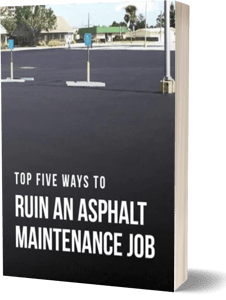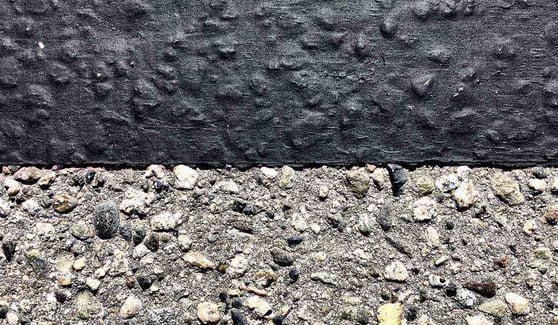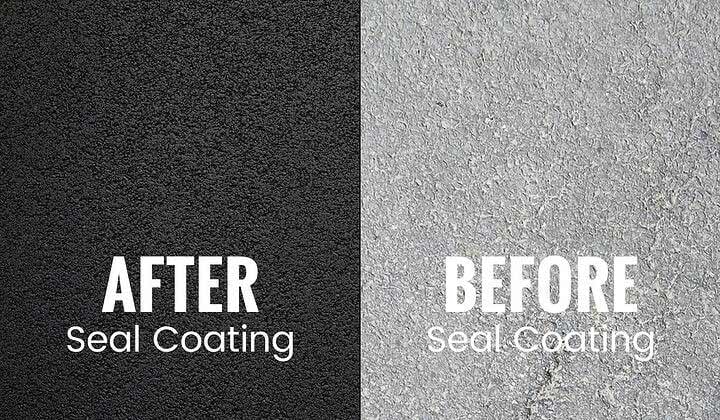Table of Contents
- What is Asphalt Sealer Used for and Why Is Asphalt Sealcoating Necessary?
- What is Asphalt Sealcoating?
- How Much Does it Cost to Seal Asphalt?
- How Often Should I Seal My Asphalt Driveway?
- Choosing Your Sealcoating Equipment
- Sealcoating Tips
- Why You Shouldn’t Seal Asphalt in Winter
- How Alligator Cracks Form
When you have asphalt on your property, it is not an asset to set and forget. Asphalt sealcoating benefits you by preserving your pavement asset.
Your driveway can last several years when properly maintained. Preventive maintenance includes periodically checking your asphalt for cracks and repairing them ASAP.
When neglected, these cracks will turn into potholes. That will even give you more expensive repairs or replacements in the future.
You may wonder why you should seal asphalt. Sealing your asphalt is a necessity if you want to protect your asphalt pavement
What is Asphalt Sealer Used for and Why Is Asphalt Sealcoating Necessary?
Asphalt is made up of two ingredients: aggregates and bitumen. About 95% of your asphalt is aggregates, which is a mixture of sand, crushed stone and gravel.
The rest is bitumen, a sticky substance that holds all the aggregates together.
Asphalt is extremely durable. But it is susceptible to cracks and potholes as it is exposed to the elements.
UV rays, grease, snow and other chemicals can damage your asphalt.
Heavy traffic is also one of the culprits for asphalt cracks.
The only way to preserve it is by applying asphalt emulsion driveway sealer.
The crucial question:
Why seal my asphalt?
It is a necessity as you need to protect your valuable asset. If you want your driveway to last, then applying asphalt seal coating is the way to go.
Unprotected asphalt leads to cracks and potholes that can severely damage your foundation.
Sealcoating offers significant benefits and it’s cost-effective in the long run and it can significantly improve the appearance of your driveway.
Related: How to Mix Asphalt Sealer in 55-Gallon Drums

THE IMPORTANCE OF SEALCOATING A DRIVEWAY
What is Asphalt Sealcoating?
While asphalt alone is durable, it's not enough for your driveway. Exposure to the sun's damaging UV rays and some chemicals will cause it to become brittle.
When not repaired, it can negatively impact the curb appeal of your driveway. In a worst-case scenario, cracks may lead to potholes that will burn a hole in your pocket./p>
Sealcoating adds a layer of protection to your asphalt. It’s a good reason why sealing your asphalt extends the life of your driveway./p>
If you are a property owner, it may even add value to your home. This is why sealing asphalt is critical.
Below are some of the benefits of sealcoating your asphalt driveway:
Sealcoating Slows Oxidation
Asphalt pavement reacts poorly to UV rays. When constantly exposed, its binder — the glue that holds the sand and stone in place — quickly deteriorates.
When oxidation progresses, your asphalt loses oil and the pavement becomes even harder. It will continue to dry out, especially with heavy traffic.
When this happens, cracks will start to form. When you do not fix this, water will make its way into your pavement foundation, damaging it even further.
It may create mini holes and even alligator cracks that are costly to repair.
The best way to slow down the oxidation is by sealcoating asphalt. Why? Because seal coating provides extra protection against UV damage.
Asphalt Sealcoating Enhances Pavement Appearance
If your parking lot looks damaged, it will not look very inviting to your customers and it can negatively affect your sales.
If you are a property owner and your asphalt pavement is full of cracks and holes, do not expect the buyer to consider your property.
Maintaining your asphalt pavement may sound simple. But the good news is that a clean and well-maintained asphalt can attract and retain tenants.
First impressions last.
That's why improving the curb appeal with sealed asphalt is crucial to your business. With sealcoating, you are assured that the aggregates are fixed into the asphalt and it will not crack.
FREE DOWNLOAD!

Get your FREE ebook on how not to ruin your asphalt
How Much Does it Cost to Seal Asphalt?
Sealcoating only costs between $0.15 and $0.35 per square foot. It's more affordable compared to asphalt installation which costs between $1.50 and $2.00 per square foot.
The benefit of sealcoating is that it not only extends the life of your asphalt pavement, but it's also an effective way to save money.
Unprotected asphalt leads to cracks and potholes which will cost you more in repairs. When neglected, it can also damage your driveway's foundation, which will cost you even more in replacements.
By sealcoating every two or three years your asphalt is protected. There will be no need for costly repairs.
However, it's also essential that you use a quality driveway sealer when sealcoating. Go with asphalt sealers that have airport-grade quality.
Visit Asphalt Kingdom if you need help with either equipment or supplies for your sealcoating.
Keep in mind though that sealing isn't the solution for cracks or potholes. It's not meant for repair but for prevention.
What sealcoating doesn't do is fix pavement defects or even restore the flexibility to your pavement.
When your pavement is beyond repair, sealcoating may be a waste of money. When your asphalt is brittle or cracked, crack filling would be the best solution.
Why does timing matter when applying asphalt sealer?
It's advisable to seal only after repairing your asphalt. You cannot sealcoat on fresh asphalt either. You need to wait when the asphalt is fully cured after about 3 to 6 months.
How Often Should I Seal My Asphalt Driveway?

How Often Should I Seal My Asphalt Driveway?
Asphalt sealcoating is beneficial when completed every two to three years. This is dependent on how much traffic your driveway gets or how constantly it is being exposed to the elements such as UV rays, snow and other chemicals.
Check your asphalt for cracks or depressions and ensure that you repair them as soon as possible.
Do not wait for small cracks to turn into problematic potholes that require expensive repairs.
It's important to note that your asphalt has to be in good condition before sealcoating it. This is why asphalt repairs should be done first.
When crack filling, do ensure that you prepare your pavement by getting rid of all the debris and dirt. It has to have a clean surface before applying the crack filler. Otherwise, it will not work.
Choosing Your Sealcoating Equipment
A variety of sealcoating equipment is available in our store. What to acquire depends on what your needs are.
Are you a DIY person thinking about why you should seal your personal asphalt driveway or are you sealcoating for business?
A homeowner may only need to purchase simple tools, while property managers need equipment that saves time and money.
Surface Preparation Supplies
First, let's take a look at the surface preparation items that you need when sealcoating your asphalt surface.
To clean the area, all you need is simply a broom and a hose. Things are entirely different if you are offering sealcoating as a service. Using gas blowers will definitely save you time and money.
When applying driveway sealant, a squeegee or a brush would suffice. Most homeowners or DIY people use either of the two to minimize cost.
Investing in more expensive equipment may not always be practical, especially if you are trying to save money.
For commercial property managers, using a squeegee just won't cut it — it will take a great deal of time to finish sealcoating.
Having a spray system would be the most beneficial sealcoating approach. You can save more time get more work done which means more money in your pocket.
You can also get accessories to keep people away from your blacktop. Sawhorses and caution tape can help. Even a simple ribbon will suffice so long as it stops tire tracks and footprints from damaging your work.
If you need help deciding which sealcoating equipment, sealant or accessories to buy, talk to one of our representatives. We are more than happy to provide assistance!

Sealcoating Tips
1. Best Season to Sealcoat
While it's not impossible to sealcoat during colder months, experts do not recommend it.
The best time to sealcoat a driveway for the biggest benefit is during spring and summer.
UV rays help your pavement to dry out pretty quickly. Without the heat, you will need more time for the driveway sealer to cure and dry.
It could increase your overall cost. Plus, it could even expose your pavement to more damage. This would be one reason why sealing your asphalt for your business wouldn’t be recommended; it isn’t a cost-effective option.
Whether you are a DIY person or a business owner, you should apply driveway sealant only in the summer as it yields a fast drying time. When the temperature reaches the 70s, it's even possible to drive on your asphalt after 12 hours.
Walking is allowed on asphalt after only 3 hours.
2. Protect Your Sealcoating
Your asphalt being freshly sealed isn’t a reason why it can't be affected by the elements or other things causing damage like oil.
Watch out for cars that have oil leaks — they can be really damaging to your new asphalt. You can address this concern by applying a degreaser.
3. When it's Time to Apply Sealcoat
If you bought a new property, it can be hard to determine whether it's time to reseal.
Although you can always ask the previous owners when they last sealed their pavement, it's always better to know the common signs that your asphalt needs a new sealcoat.
Watch out for gray spots and patches on your asphalt, weeds, fine cracks on the surfaces and water seeping into the blacktop. These signs are why you should seal asphalt.
4. Block Traffic to Your Asphalt Driveway
Keep people away from the freshly sealed asphalt. You can put a sign indicating that walking or driving isn't allowed.
It's imperative that the sealcoat dries and bonds with the asphalt before using your blacktop.
Otherwise, the driveway sealant may get dislodged due to tire movement. That will only create bumps, destroying all your hard work.
Related: How Long Do You Need to Stay Off The Driveway After Applying Sealcoating?
5. Fresh Asphalt and Sealcoating
Curing is critical and it’s why you should never apply sealer to your fresh asphalt. You should give it ample time to cure. Generally, you can wait between 3-6 months before you can seal a driveway for the first time.
6. Weather Forecast
If you're not sealcoating in the summer, make sure that you check the weather forecast first. When it rains, your sealcoat will not dry properly.

Application tips:
- Use squeegees when you are sealcoating smaller areas. For a larger space, it's best to consider a sprayer instead. You can get your task done quicker with the latter.
- Keep in mind that you can also use sand mixed with the sealant to provide more consistency and to create a non-slippery surface to the product.
- Do you want to quickly clean and remove all debris in your asphalt? Use a pressure washer, but be sure to let it dry thoroughly after.
- If there are oil stains in the asphalt, you can remove them using an oil stain primer.
- Sealcoating’s only benefit is why it’s recommended for sealing the asphalt, not for fixing cracks or potholes. Fix the asphalt first before sealcoating it.
- Be careful when applying a seal coat. Some sealcoat products may stain concrete sidewalks and garage doors.
7. Clean the Asphalt
Here’s why you should follow these sealing asphalt tips for a job done right. Read this list to make sure you sealcoat your driveway or parking lot correctly.
- Remove all mud, vegetation, loose particles of sand and gravel, etc. Wash the entire surface to be sealed with water, brush dirty spots, rinse and remove standing puddles of water.
- Patch any depressions with whatever patching compound is required. Deep holes will require a cold blacktop patch. Shallow depressions (where the blacktop has slightly eroded) can be patched with various smooth asphalt patching compounds that often have the consistency of cake icing. Be sure to follow directions, as some of these compounds might need to dry for several days before they are sealed!
- Patch any cracks 1/8 inch or larger. Deep cracks should be filled with coarse sand to within 1/2 inch of the surface. Wide cracks up to 1 inch may require acrylic crack fillers that remain more flexible.
- Remove caked up oil drippings. Clean oil spots with special oil cleaners available from sealer companies. Tough spots should have a special oil primer applied so the sealer sticks to the oil-stained area.
Why You Shouldn’t Seal Asphalt in Winter
Sealcoating is the best solution for prolonging the life of your blacktop up to 30 years. It protects your asphalt pavement from UV damage, rain, snow, leaks and other things that damage it.
But can you sealcoat year-round?
The answer is no. You should avoid sealcoating when the temperature falls below 50 degrees Fahrenheit. Otherwise, the binder particles will not be effective.
Additionally, your asphalt pavement will only look blotchy and gray. When you sealcoat at a temperature below 32 degrees Fahrenheit, the sealer film will either shatter or not bond.
The humidity and cold greatly impact sealcoating benefits in the winter months.
When the humidity is too high, it can increase the moisture level in the air. As a result, it will take time for your asphalt pavement to fully dry out.
The ground temperature has to be more than 50 degrees Fahrenheit for your pavement to dry out quickly.
One reason why professionals recommend sealing asphalt only during the summer months is that using a sprayer generally isn't possible in the winter. It would have to be done manually and that will cost you more.
There are costly risks involved if you decide to sealcoat in the winter. The best solution would be to make sure that your asphalt is repaired.
Work on correcting other issues, such as potholes and cracks. Wait for either spring or summer to begin sealcoating your asphalt.
Related: Here's Why Sealing Your Asphalt Pavement Reduces Snow Plow Damage
Sealcoating Benefits for Pavement Preservation
Sealcoating is the only solution to extending the life of your asphalt pavement.
When you sealcoat every two to three years or when necessary, it can withstand heavy traffic without cracking.
Expect a cleaner and smoother pavement. This is why sealing the asphalt is so crucial. Your driveway will have a fresher and newer look. Most importantly, it will last for several years.
Do you have questions about asphalt sealcoating? Speak with one of our representatives so we can better assist you. We are always ready to help!










.jpg)